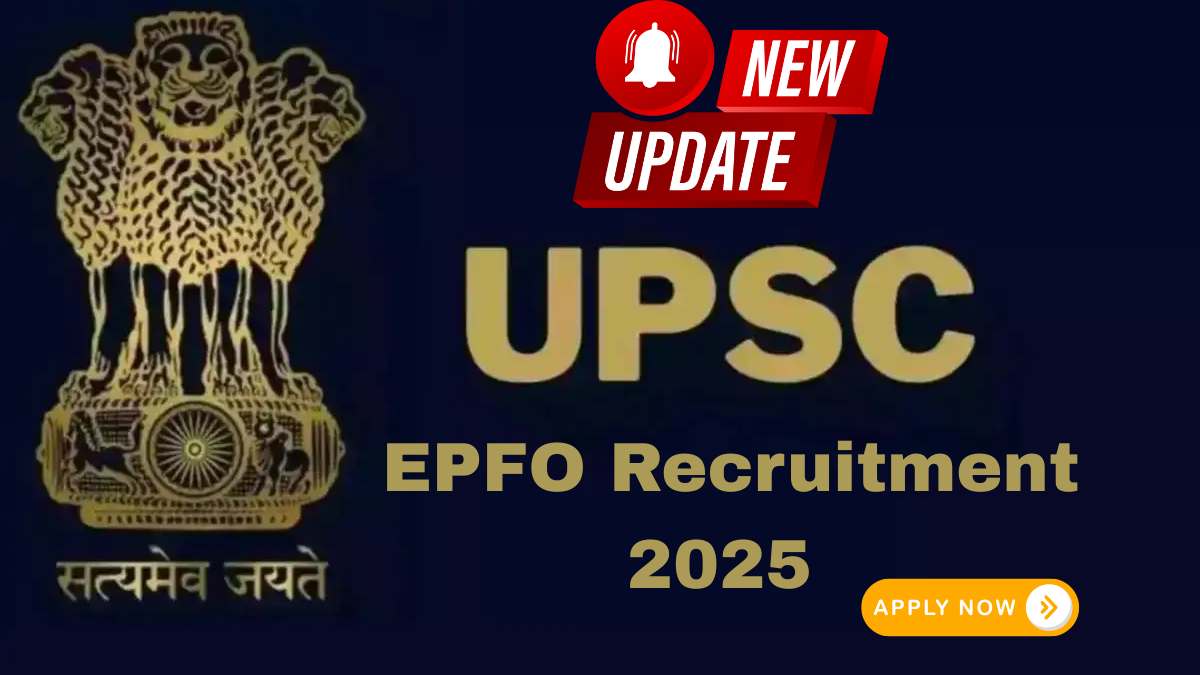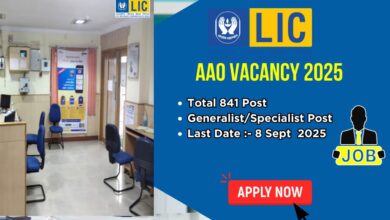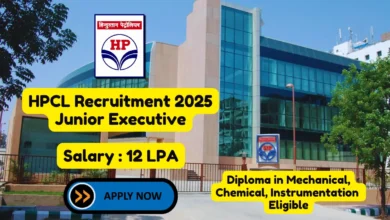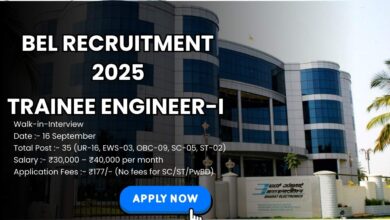UPSC EPFO Recruitment 2025 | Total Post 230 | Eligibility | Salary
Union Public Service Commission (UPSC) has invited the applications for EPFO (Enforcement Officer & Assistant PF Commissioner) Post, the eligible candidates can apply for this post at the official website of UPSC at upsc.gov.in. The canddiate will be hired through a 2 stage first written test and an interview.
The total no of this recruitment will be 230 and the mode of application will be completely online last date to apply is 18 August 2025

Important Dates
| UPSC EPFO Exam 2025 – Important Dates | |
|---|---|
| Notification Date | 29th July 2025 |
| Opening Date of Registration | 29th July 2025 |
| Closing Date of Registration | 18th August 2025 |
| Admit Card | 1 week before exam |
| UPSC EPFO Exam Date 2025 | 30th November 2025 (expected) |
Also Read : SBI PO Prelims Admit Card 2025 released Download
UPSC EPFO Vacancy 2025 Details
There will be total 230 vacancies in this recruitment where 156 post are there for EO/AO where, 78 post for Unreserved, 23 for SC, 12 for ST, 42 for OBC and 1 for EWC.
and 74 post are for APFC in which 32 are for unreserved, 7 for SC, 28 for OBC, 7 for EWC.
| Posts | UR | SC | ST | OBC | EWS | Total Vacancies |
|---|---|---|---|---|---|---|
| Enforcement Officer (EO)/ Accounts Officer (AO) | 78 | 23 | 12 | 42 | 01 | 156 |
| Assistant Provident Fund Commissioner (APFC) | 32 | 07 | — | 28 | 07 | 74 |
| Total | 110 | 30 | 12 | 70 | 08 | 230 |
UPSC EPFO Eligibility Criteria
Bachelor’s Degree in any subject from recognised university or institute for both of the post
The candidates must full fill the upper age limit i.e, 35 years for APFC and 30 years of EO/AO and there will be a upper age relaxation as per the government rule
UPSC EPFO 2025 Application Fee
The candidates have to pay the required amount to fill up the application form
| Category | Fees |
|---|---|
| Gen/ OBC/ EWS | Rs. 25/- |
| SC/ ST/ PwD/ Female | Rs. 0/- |
| Mode of Payment | |
| Online | |
candidate can use card or net banking of any bank or using Visa/Master/Rupay/Credit/Debit Card/ UPI Payment.
How to apply for UPSC EPFO 2025
- Click on the below given link
- One the page click on the Apply Now option
- Then check for the declaration at the bottom of the page
- Fill the personal details
- Submit the Part I of the UPSC EPFO Officer application form
- Now, Fill the Part II of the form and made fee payment, upload photograph, signature, required documents and select the examination center.
- Verify all the entered details and click on Submit
UPSC EPFO 2025 Selection Process
There will be two stages in the selection process
Stage -1 Written Exam
There will Multiple Choice Question (MCQ) for total 300 marks in which total no of question will be 120 and each question carries 2.5 marks.
for the wrong answer there will be a penalty of 1/3rd of the marks and this test will be in both Hindi and English candidates can choice according to their, the duration of this exam will, be 2 hours.
Stage 2- Interview/Personality Test
This stage will carry total 100 marks which contributes total 25% for the final selection, the minimum qualifying marks will be different for each category :
- 50 for General/EWS
- 45 for OBC
- 40 for SC/ST/PH
UPSC EPFO 2025 Exam Pattern
| Parts | Name Of The Topic | Total Marks | Time |
|---|---|---|---|
| Part A | General English and Vocabulary | 300 | 2 Hours |
| Part B | Indian Culture, and Freedom Movements with Current Events | – | Included in Part A Duration |
| Population, Development, and Globalization | |||
| Constitution of India | |||
| Current trends in the Indian Economy | |||
| Accounting and Auditing, Industrial Relations, Labor Laws, Insurance | |||
| Basic Knowledge of Computer Applications, and General Science | |||
| Elementary Mathematics, Statistics, and General Mental Ability | |||
| Social Security in India | |||
| Interview | UPSC EPFO Interview | 100 | – |
UPSC EPFO 2025 Syllabus
| Subject | Topics |
|---|---|
| General English and Vocabulary | Idioms and Phrases, Tenses, Word Formation, Fill in the Blanks, Synonyms & Antonyms, Verb & Adverb, Vocabulary, Theme Detection, Articles, Sentence Completion, Error Correction, Conclusion, Subject-Verb Agreement, Passage Completion, Grammar, Comprehension, Unseen Passages, Sentence Rearrangement |
| General Science | Newton’s Laws of Motion, Units and Measurements, Thermal Properties of Matter, Gravitation, Kinetic Theory, Wave Optics, Work, Energy, and Power, Physical World, Oscillations, Ray Optics and Optical Instruments, Mechanical Properties of Solids, Thermodynamics, Motion in a Straight Line, Nuclei, Motion in a Plane, Systems of Particles and Rotational Motion, Mechanical Properties of Fluids, Moving Charges and Magnetism, Electric Charges and Fields, Electrostatic Potential and Capacitance, Electromagnetic Induction, Current Electricity, Magnetism and Matter, Dual Nature of Radiation and Matter, Alternating Current, Atoms, Electromagnetic Waves, Semiconductor Electronics, Waves, The S–Block Elements, Communication Systems, Organic Chemistry: Basic Principles & Hydrocarbons, P-Block Elements (Group 14 – Carbon Family), Solutions, Chemical Bonding & Molecular Structure, Electrochemistry and Chemical Kinetics, Haloalkanes and Haloarenes, General Principles of Metallurgy, Organic Compounds Containing C, H, and O, P-Block Elements (Group 13 – Boron Family), P-Block Elements, D and F Block Elements & Coordination Compounds, Classification of Elements and Periodicity in Properties, Environmental Chemistry, Biomolecules, Solid-State, States of Matter: Gases and Liquids, Chemistry in Everyday Life |
| General Mental Ability | Analogy, Classification, Series, Coding-Decoding, Blood Relations, Direction Sense Test, Mathematical Operations, Arithmetical Reasoning, Logical Venn Diagrams, Alphabet Test, Sitting Arrangements, Inserting the Missing Character, Number, Ranking and Time Sequence Test, Eligibility Test |
| Computer Fundamentals | Basic Concepts, Operating System, Cyber Security, Software Packages, Spreadsheet, Working with Internet |
| Statistics, Economics, and Mathematics | Collection, Classification, Tabulation, and Diagrammatic Presentation of Data; Measures of Central Tendency, Dispersion, Moments; Index Number: Uses, Types, and Limitations; Construction of Index Numbers; Simple and Weighted Aggregate Method; Simple and Weighted Average Price-Relatives; Chain Base Index Numbers; Base Shifting; Cost of Living Index Numbers; Design of Sample Survey: Sampling Unit, Frame, Fraction, With/Without Replacement, Population Parameter, Estimator, Simple Random, Stratified, Systematic, Cluster Sampling; Correlation and Regression: Coefficients, Linear Regression; Time Series Analysis: Components, Measurements of Trend, Seasonal, Cyclical and Irregular Variations |
The candidates who meet the above given criteria are eligible for this can apply from here



